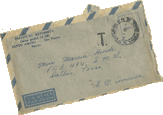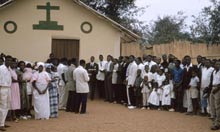“Speaking out…”

Dear Deolinda,
Along with reading parts of your diary loaned to me by Rose, I’ve also read an article about you that she recently forwarded to me. It was a paper written by Ismael Gaspar Martins, Permanent Ambassador to the United Nations from Angola. She sent it to me via email.
 You would have reveled in this technology of instant communication, Deolinda, not available to you during your lifetime. I’m positive you would have added it as a weapon to your growing arsenal of tools for the cause, combining them with the raw courage and commitment that enabled you to accomplish so much in the short time allotted to you on this earth.
You would have reveled in this technology of instant communication, Deolinda, not available to you during your lifetime. I’m positive you would have added it as a weapon to your growing arsenal of tools for the cause, combining them with the raw courage and commitment that enabled you to accomplish so much in the short time allotted to you on this earth.
Beginning to translate the diary from Portuguese to English, one of the first things I noticed was Jacinto Fortunato’s tribute to you. He titled it, “Deolinda Rodrigues: Profile of an Indomitable Fighter.”
After finding those two letters from him among those from you in the Angola memorabilia uncovered during last winter’s snowstorms, I was particularly interested in his words of praise about you.
 He said you broke through the precepts preserved by a colonial society that placed women in a secondary and submissive position. Part of your struggle for liberation was the pursuit of a more just world, with the goal of emancipating all Angolans from servitude and providing them equal opportunities, including women.
He said you broke through the precepts preserved by a colonial society that placed women in a secondary and submissive position. Part of your struggle for liberation was the pursuit of a more just world, with the goal of emancipating all Angolans from servitude and providing them equal opportunities, including women.
He talked about your command of Kimbundu and English, attributes that transformed you into one of the most eloquent and preferred interpreters of the Angola missionaries. You could translate simultaneously from English to Portuguese and from Portuguese to Kimbundu, revealing an enormous cultural flexibility and solid intellectualism.
At the Methodist school in Sao Paulo, Brazil, you were considered one of the brightest students, an exemplary and dedicated scholar.
Patriotism was another of your personality characteristics that Jacinto cited. You were obsessed by the idea of Angolan independence. He gave the impression that you didn’t talk about anything else! As he noted, you sacrificed your life for that cause.
In his closing thoughts about you, Jacinto said your example would be remembered by future generations, that they would recognize your courage and even willingness to sacrifice your life for the cause of liberty. You died too soon, Jacinto said, but you won the battle for the principles for which you fought. You were the indomitable Deolinda.
The document written by Ambassador Ismael was a study of religious expansion into African territories by the Christian church, and he referenced your diary throughout his discussion.
In Angola, Catholics and Protestants offered different strategies to deal with the colonial system. Protestants used sacred biblical texts as a call to resist Portuguese colonialism. Methodism in particular provided coherence to the emerging black national culture.
Ismael cited the Methodist creation of small class churches as a social network, creating “family” within the African community. In your diary, you compared them to the Catacombs. As the battle for independence became more heated, members of Protestant churches were persecuted, many pastors killed. Village Christians began burying their Bibles and hymnals to avoid repression by Portuguese Dictator Salazar’s secret police operating in Angola.
You began to have doubts about your faith in God, according to your diary entries. You even commented that it was easy for the missionaries to say they were Christian, when they lived such easy lives: no hunger, no need to walk long distances, never subject to humiliation by a person of authority.
As early as April of 1958, before you left for Brazil, you wrote somewhat facetiously that one of the missionary women thought your youth group was meditating on the Word of God. In reality, you were talking about the political situation in the country. You vowed that once you recovered your dignity as full members of society, you could decide if you wanted to be Christians or not. If the church served as a means of furthering the nationalist agenda, perhaps then you would go to Sunday services.
Once again, Deolinda, your ability to question openly a way of life that in some ways opened doors of opportunity for you was in itself another act of courage.
